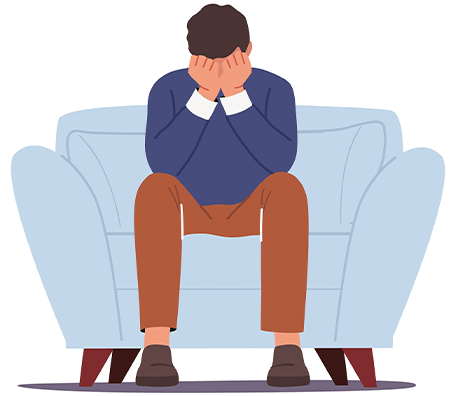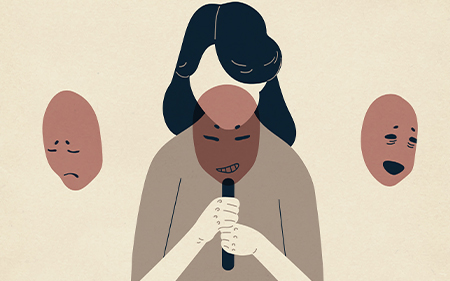 Francis* felt wracked with anxiety.
Francis* felt wracked with anxiety.
Francis dreaded nighttime. He’d learned that monsters were real, but they didn’t hide under the bed, like when he was a child. They lived inside his dreams. Fifteen years in the service and eight years as a police officer allowed him to see the worst of what people can do.
Two weeks ago, he woke up with his arm around his wife’s neck, acting out a nightmare he thought was real. He was scared, and so was his wife.
Francis was barely keeping afloat on the job.
He tried to push away the thoughts. Things were looking grim – his marriage was crumbling, and he was drinking more.
 Abuse robbed Allison* of her childhood.
Abuse robbed Allison* of her childhood.
Allison was hit a lot as a kid. She had to learn how to hide the bruises. Later, she had a series of relationships that started promising but fell apart.
She learned that people would take advantage of you if they could. So, she formed a hard shell that allowed nobody inside.
Trust was a liability for Allison, and so were feelings. She became an expert at stuffing her emotions.
 Violation kept Desmond* in constant fear.
Violation kept Desmond* in constant fear.
Desmond walked around with his head on a swivel. The memories of his rape crashed over him anytime he saw someone on the street who looked like his attacker. His body would freeze while his mind screamed at him to run.
His shame threatened to bury him alive, and he stopped eating and lost weight. His doctor was concerned and begged him to talk with someone.
For months, he put off his doctor’s recommendation. He couldn’t bear talking about that night and couldn’t imagine things would improve.
Desmond started sleeping during the day and repeatedly checked the locks on the doors and windows. He was losing himself, and it’d been a long time since he’d felt relaxed.
Not all therapies are equal.
Francis, Allison, and Desmond learned about what makes evidence-based therapies effective and about their various therapy options.
One option is Cognitive Processing Therapy, a treatment that helps you identify unhelpful beliefs. You may believe that people can’t be trusted, causing you to be on guard for something terrible. As a result, you don’t let people get close for fear of being hurt. Therefore, the best way to manage your feelings is to push people away. Unfortunately, protecting yourself from those beliefs prevents you from living the life you would like to live.
Prolonged Exposure (PE) helps address those trauma memories by processing through them instead of pushing them away.
PE helps teach us a few important things about those traumatic memories. For instance, the more we process the trauma memory, the more control we take back from PTSD. In addition, we learn that not all anxiety equals danger and that we should not avoid everything that makes us feel anxious.
Finally, EMDR is an evidence-based therapy designed to help your brain heal after trauma. Much like your body’s design allows it to heal after an injury, your brain tries to heal after a stressful event but can get stuck. Through EMDR, you learn to reprocess events that trigger those memories, allowing you to put that trauma in the past.
 Don’t let anxiety rule your life.
Don’t let anxiety rule your life.
If any of the above beliefs sound familiar, I can help teach you specific tools to evaluate these thoughts (and the many others) that you may have developed over the years. I can teach you how to balance your anxiety and see the world in healthier ways that will keep you safe.
And to be honest, if avoiding reminders of the trauma provided an effective way of helping you recover, you wouldn’t need therapy. Avoidance is “fuel” that inadvertently keeps that mental illness active. Our goal is to take away that fuel to help you regain control of your life. Instead of avoiding the anxiety, you will look at it, process it, and take back your power.
Some people express apprehension at beginning trauma treatment. They fear things will get worse because the only way they’ve learned to manage their emotions is by a complex dance of trying to push them away to avoid trauma triggers.
But consider this – if you were satisfied with your life, you likely wouldn’t be looking for therapy. You’d be happy! But I guess that things aren’t going well.
It’s time to let go of your anxiety.
How long have you been carrying this stress? What would it be worth to you to finally have mastery over your symptoms, be able to connect with your family and friends, and get out and enjoy life?
We can work together to answer these questions in the affirmative. I offer a variety of treatment methods that allow us to design an approach specific to your needs.
Please don’t wait for things to get better on their own. If it were going to happen, it would have already happened.
Call me today at (312) 270-0098, so we can find a solution that works for you.
*Names and stories are composite narratives and do not reflect actual clients.

